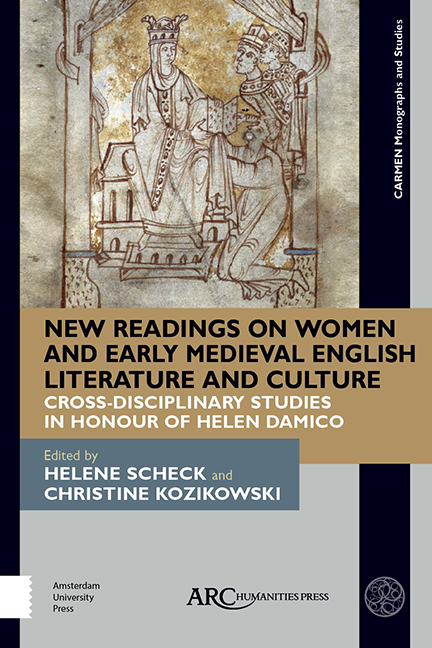 New Readings on Women and Early Medieval English Literature and Culture
New Readings on Women and Early Medieval English Literature and Culture Book contents
- Frontmatter
- Contents
- List of Illustrations
- List of Abbreviations
- Note from the Editors
- Introduction: Feminism and Early English Studies Now
- PART ONE LITERACY AND MATERIAL CULTURE
- PART TWO ENGENDERING MARRIAGE AND FAMILY
- PART THREE WOMEN OF THE BEOWULF MANUSCRIPT
- PART FOUR WOMEN AND ANGLO-SAXON STUDIES
- Select Bibliography
- Index of Manuscripts
- General Index
1 - Anglo-Saxon Women, Woman, and Womanhood
Published online by Cambridge University Press: 20 November 2020
- Frontmatter
- Contents
- List of Illustrations
- List of Abbreviations
- Note from the Editors
- Introduction: Feminism and Early English Studies Now
- PART ONE LITERACY AND MATERIAL CULTURE
- PART TWO ENGENDERING MARRIAGE AND FAMILY
- PART THREE WOMEN OF THE BEOWULF MANUSCRIPT
- PART FOUR WOMEN AND ANGLO-SAXON STUDIES
- Select Bibliography
- Index of Manuscripts
- General Index
Summary
WHEN HELEN DAMICO chaired the session in which Elizabeth Coatsworth and I presented a research report at the Stanford ISAS in 1995, she not only took care of us on that occasion, but throughout the whole conference, and has continued to take an interest in us and our work ever since. As a wonderful scholar, and also a warm, kind person, she has greatly enriched the community of Anglo-Saxonists.
I share with Helen an interest in women's matters in relation to Anglo-Saxon culture and for some years I taught an undergraduate course at the University of Manchester (UK) called “Anglo-Saxon Woman.” I was both frustrated and amused to find how often in paperwork of both administrators and students my carefully worded title morphed into “Anglo-Saxon Women.” This paper discusses these concepts and that of Womanhood.
Women
The Old English poem The Fortunes of Men begins:
Ful oft þæt gegongeð, mid godes meahtum,
þætte wer ond wif in woruld cennað
bearn mid gebyrdum ond mid bleom gyrwað
tennaþ ond tætaþ, oþþæt seo tid cymeð,
gegæþ gearrimum, þæt þa geongan leomu,
liffæstan leoþu, geloden weorþað.
Fergað swa ond feþað fæder ond modor,
giefað ond gierwaþ. God ana wat
Hwæt him weaxendum winter bringað!
It very often happens through God's powers that man and woman bring forth a child by birth into the world, and clothe him in colours and curb him and teach him until the time comes and it happens with the passing of the years that the young and lively limbs and members are mature. Thus his father and mother lead him along and guide his footsteps and provide for him and clothe him— but only God knows what the years will bring him as he grows up.
It comes as a welcome change to find an Old English poet acknowledging that a child is the product of a man and a woman to those of us steeped in heroic poetry in which men are regularly introduced as the sons of their fathers such as “afaran Eadwardes” (The Battle of Brunanburh), “Wulfstanes bearn” (The Battle of Maldon), or “Weoxstanes sunu” (Beowulf).
Marriage is perhaps so taken for granted in the Anglo-Saxon world that it does not have to be foregrounded.
- Type
- Chapter
- Information
- New Readings on Women and Early Medieval English Literature and CultureCross-Disciplinary Studies in Honour of Helen Damico, pp. 23 - 42Publisher: Amsterdam University PressPrint publication year: 2019


